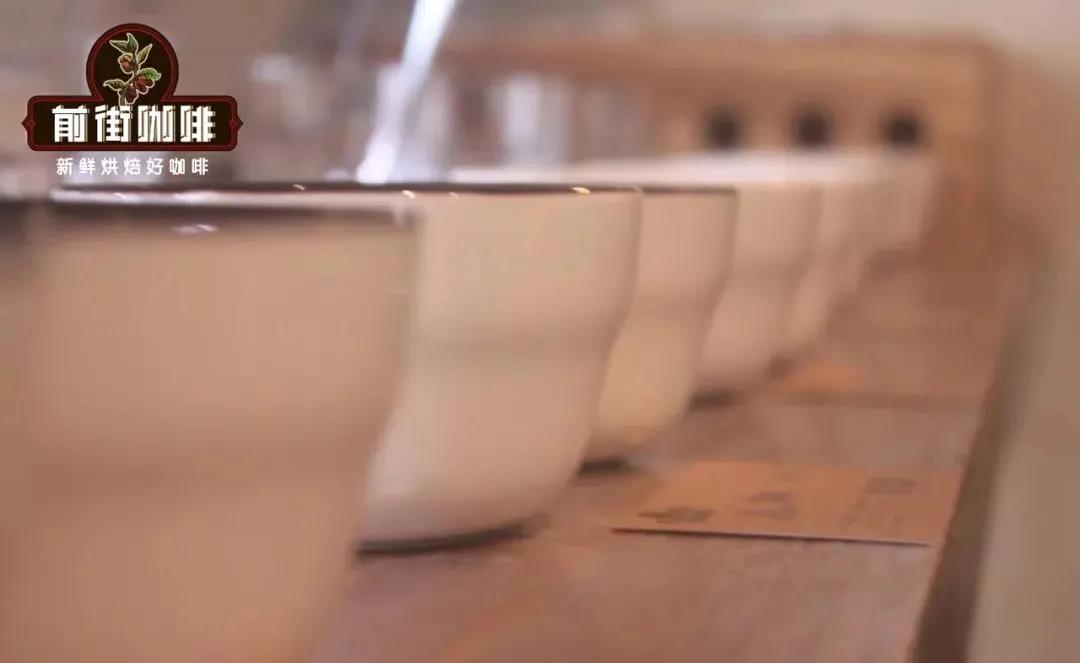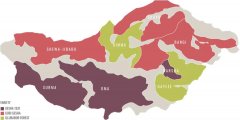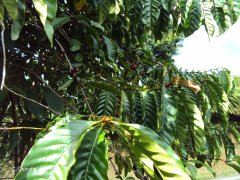Ethiopia Yegashifi Erica Coffee beans juicy Sun how to make Erica Coffee

Professional coffee knowledge exchange More coffee bean information Please pay attention to coffee workshop (Weixin Official Accounts cafe_style)
Erica, this coffee bean is familiar to Ethiopian fans. The score of this bean has reached an amazing 95 in the International Cup website Coffee Review, which shows the high quality. From the appearance, consistency and freshness of the green beans to the dry aroma and flavor of the coffee, they are excellent. Adorsi's treatment plant, Ereca, won the TOH solarization category with 91 points in the 2019 season. Comprehensive all the beans with such high scores, Qianjie also couldn't help but buy this coffee bean.
Who's Erica?
Aricha
Aricha is named after Aricha kebele in Ethiopia's Yegashefi region. Not far east of Yirgacheffe lies the village of Aricha kebele, about eight kilometres from the centre of Yirgacheffe town, the smallest administrative unit in Ethiopia, with a population of about 500 families (3,500 - 4,000), roughly the size of a community.

Coffee in this area comes mostly from wild species in native forests and naturally cultivated species of indigenous people. Therefore, the coffee tree species in this area are very diverse, often a batch of beans contains up to 2~30 varieties, but also because of the harvest from the original forest above 1850 meters above sea level, so can not be named after the manor name, had to use the harvest area of Erecha name.
T.O.H. competition
Taste of Harvest
The Harvest Season Flavor Cup is a green bean competition organized by the African Fine Coffees Association(AFCA) among African producing countries, similar to the Cup of Excellence in Central and South America. There are currently seven member states: Ethiopia, Kenya, Uganda, Tanzania, Malawi, Zambia and the Republic of Congo.

The competition is divided into regional competitions and competitions throughout Africa, and the batches with cup scores below 80 points are eliminated first in the preliminary round. TOH selects the highest quality green beans from each region, which are cup-tested and graded by national and international judges based on the standards of the Specialty Coffee Association of America (SCAA).
Ardos Treatment Plant
Adorsi
Adorsi Processing Plant is owned by Testi Coffee, a coffee export company run by the Yonis family, which was acquired in 2009 by Faysel A. Yonis is established. In terms of competition results, the 2019 season champion batch of Erecha scored 91 points, while the 2018 season peony won 88 points in the competition, and the 2019 season of Erecha was more than three points higher than the peony.

The front street tests the 2019 season's Erecha coffee beans through cups, and the rich taste makes it look like a "fruit bomb." On the palate, it has soft citrus aromas with berry and peach aromas. The palate is smooth with milky aromas, surrounded by lemon and grape acidity. The aftertaste is rich, and the fragrance of flowers is the ultimate performance of this bean!
coffee varieties
Heirloom
Erecha coffee bean varieties are native species. Most Ethiopian coffee varieties will be named after this name. In fact, there are too many varieties. It is like the natural gene bank of Arabica. On the one hand, there are many varieties and it is difficult to identify and classify them. On the other hand, the Ethiopian government is unwilling and unable to disclose the information of these varieties for protection reasons. That's why Ethiopian coffee beans vary in size.

This Erecha coffee bean from the front street is slightly larger in size and slightly lower in density and moisture content. Yirgacheffe Aricha Grade 1 green beans yellow color, is typical of the color of sun coffee, particles are uniform and full, less defective beans.

Production area: Yega Shefi Erecha
Treatment plant: Adorsi
Altitude: 1900-2000m
Treatment method: sun exposure
Grade: G1
Breed: Heirloom Native
Coffee bean processing
Natural
In the farm sun process, coffee berries are picked and placed in sunbeds, where they change from red to dark brown in two weeks. After the storage period, the green coffee beans are removed while removing all dried rind, pulp and parchment layers. Qianjie believes that the advantage of this kind of sun exposure is that it can completely isolate the miscellaneous smell brought by contact with soil, on the other hand, it can also improve the drying efficiency of coffee cherries, and more completely present the original fruit flavor of coffee. This kind of work improves the overall cup test quality and consistency after roasting.

After two weeks of drying, the arica is dried to a dark brown rind and stored until the flavor ripens. The dried pulp and parchment are removed only after the coffee has matured and before shipment. Then pick out unripe beans, overripe beans and fermented beans, ready for shipment!
Front Street Coffee Roasting Records
Baking machine Yangjia 800N (baking capacity 300g): furnace temperature 165℃ into the pot, fire 120, damper open 3; return temperature point 136 ", when the furnace temperature 148 ℃, the damper open to 4, fire unchanged; furnace temperature 166℃ when the bean surface turns yellow, grass smell completely disappears, enter the dehydration stage, fire unchanged, damper 5;

7 37", the bean surface appears ugly beard wrinkles and black stripes, toast flavor obviously changed to coffee fragrance, can be defined as a prelude to explosion, this time to hear the sound of a burst point, to 8 38" to start a burst, the damper unchanged, a burst after the development of 1 45", 195℃ pot.
Front Street Coffee Brewing Experience
Filter bowl: V60 #01
Water temperature: 90 degrees
Powder: 15g
Powder water ratio: 1:15
Grinding degree: medium fine grinding degree (No. 20 sieve bowl sieve powder to 78%)

Front street brewing technique: wet filter paper and preheat filter cup and coffee pot first. Steaming with 30g water for 30s, injecting water in a circle to 125g with small water flow, stopping injecting water to 225g when the water level drops and exposing the powder bed, removing the filter cup when the water level drops and exposing the powder bed, and extracting for 200 ".
Brewing Flavor: It smells of ripe fruit. It has obvious fermentation fragrance in the entrance. It is green and warm. It has lemon acidity and creamy smoothness. The end has ripe grape juice feeling.
More fine coffee beans, please add private WeChat Qianjie Coffee, WeChat: kaixinguoguo0925
Erica, this coffee bean is familiar to Ethiopian fans. The score of this bean has reached an amazing 95 in the International Cup website Coffee Review, which shows the high quality. From the appearance, consistency and freshness of the green beans to the dry aroma and flavor of the coffee, they are excellent. Adorsi's treatment plant, Ereca, won the TOH solarization category with 91 points in the 2019 season. Comprehensive all the beans with such high scores, Qianjie also couldn't help but buy this coffee bean.
Who's Erica?
Aricha
Aricha is named after Aricha kebele in Ethiopia's Yegashefi region. Not far east of Yirgacheffe lies the village of Aricha kebele, about eight kilometres from the centre of Yirgacheffe town, the smallest administrative unit in Ethiopia, with a population of about 500 families (3,500 - 4,000), roughly the size of a community.
Coffee in this area comes mostly from wild species in native forests and naturally cultivated species of indigenous people. Therefore, the coffee tree species in this area are very diverse, often a batch of beans contains up to 2~30 varieties, but also because of the harvest from the original forest above 1850 meters above sea level, so can not be named after the manor name, had to use the harvest area of Erecha name.
T.O.H. competition
Taste of Harvest
The Harvest Season Flavor Cup is a green bean competition organized by the African Fine Coffees Association(AFCA) among African producing countries, similar to the Cup of Excellence in Central and South America. There are currently seven member states: Ethiopia, Kenya, Uganda, Tanzania, Malawi, Zambia and the Republic of Congo.
The competition is divided into regional competitions and competitions throughout Africa, and the batches with cup scores below 80 points are eliminated first in the preliminary round. TOH selects the highest quality green beans from each region, which are cup-tested and graded by national and international judges based on the standards of the Specialty Coffee Association of America (SCAA).
Ardos Treatment Plant
Adorsi
Adorsi Processing Plant is owned by Testi Coffee, a coffee export company run by the Yonis family, which was acquired in 2009 by Faysel A. Yonis is established. In terms of competition results, the 2019 season champion batch of Erecha scored 91 points, while the 2018 season peony won 88 points in the competition, and the 2019 season of Erecha was more than three points higher than the peony.
The front street tests the 2019 season's Erecha coffee beans through cups, and the rich taste makes it look like a "fruit bomb." On the palate, it has soft citrus aromas with berry and peach aromas. The palate is smooth with milky aromas, surrounded by lemon and grape acidity. The aftertaste is rich, and the fragrance of flowers is the ultimate performance of this bean!
coffee varieties
Heirloom
Erecha coffee bean varieties are native species. Most Ethiopian coffee varieties will be named after this name. In fact, there are too many varieties. It is like the natural gene bank of Arabica. On the one hand, there are many varieties and it is difficult to identify and classify them. On the other hand, the Ethiopian government is unwilling and unable to disclose the information of these varieties for protection reasons. That's why Ethiopian coffee beans vary in size.
This Erecha coffee bean from the front street is slightly larger in size and slightly lower in density and moisture content. Yirgacheffe Aricha Grade 1 green beans yellow color, is typical of the color of sun coffee, particles are uniform and full, less defective beans.
Production area: Yega Shefi Erecha
Treatment plant: Adorsi
Altitude: 1900-2000m
Treatment method: sun exposure
Grade: G1
Breed: Heirloom Native
Coffee bean processing
Natural
In the farm sun process, coffee berries are picked and placed in sunbeds, where they change from red to dark brown in two weeks. After the storage period, the green coffee beans are removed while removing all dried rind, pulp and parchment layers. Qianjie believes that the advantage of this kind of sun exposure is that it can completely isolate the miscellaneous smell brought by contact with soil, on the other hand, it can also improve the drying efficiency of coffee cherries, and more completely present the original fruit flavor of coffee. This kind of work improves the overall cup test quality and consistency after roasting.
After two weeks of drying, the arica is dried to a dark brown rind and stored until the flavor ripens. The dried pulp and parchment are removed only after the coffee has matured and before shipment. Then pick out the unripe beans, overripe beans and fermented beans, ready for shipment!
Front Street Coffee Roasting Records
Baking machine Yangjia 800N (baking capacity 300g): furnace temperature 165℃ into the pot, fire 120, damper open 3; return temperature point 136 ", when the furnace temperature 148 ℃, the damper open to 4, fire unchanged; furnace temperature 166℃ when the bean surface turns yellow, grass smell completely disappears, enter the dehydration stage, fire unchanged, damper 5;
7 37", the bean surface appears ugly beard wrinkles and black stripes, toast flavor obviously changed to coffee fragrance, can be defined as a prelude to explosion, this time to hear the sound of a burst point, to 8 38" to start a burst, the damper unchanged, a burst after the development of 1 45", 195℃ pot.
Front Street Coffee Brewing Experience
Filter bowl: V60 #01
Water temperature: 90 degrees
Powder: 15g
Powder water ratio: 1:15
Grinding degree: medium fine grinding degree (No. 20 sieve bowl sieve powder to 78%)
Front street brewing technique: wet filter paper and preheat filter cup and coffee pot first. Steaming with 30g water for 30s, injecting water in a circle to 125g with small water flow, stopping injecting water to 225g when the water level drops and exposing the powder bed, removing the filter cup when the water level drops and exposing the powder bed, and extracting for 200 ".
Brewing Flavor: It smells of ripe fruit. It has obvious fermentation fragrance in the entrance. It is green and warm. It has lemon acidity and creamy smoothness. The end has ripe grape juice feeling.
Important Notice :
前街咖啡 FrontStreet Coffee has moved to new addredd:
FrontStreet Coffee Address: 315,Donghua East Road,GuangZhou
Tel:020 38364473
- Prev

What is the difference between the flavor of rose summer coffee in Ethiopia and that in Panama?
Professional coffee knowledge exchange more coffee bean information Please follow the coffee workshop (Wechat official account cafe_style) Rose Summer Coffee is well-known. In addition to Panama, Rose Summer Coffee is also grown in Costa Rica, Colombia and other countries, including the famous Rosa Village manor in Ethiopia. In the front street, through a cup of rosy summer coffee from the village and the well-known Bana.
- Next

What kind of coffee do Liberica coffee beans belong to? How does Liberia compare with Arabica?
There are more than 120 identified species of coffee. Producers, traders, roasters, baristas and consumers will be mainly familiar with two of them: Arabica coffee and robusta coffee. However, the third species after these two species is mainly grown in Southeast Asia: free coffee. Today, it has become the main species of coffee grown in Malaysia and the Philippines. So, lib
Related
- Beginners will see the "Coffee pull flower" guide!
- What is the difference between ice blog purified milk and ordinary milk coffee?
- Why is the Philippines the largest producer of crops in Liberia?
- For coffee extraction, should the fine powder be retained?
- How does extracted espresso fill pressed powder? How much strength does it take to press the powder?
- How to make jasmine cold extract coffee? Is the jasmine + latte good?
- Will this little toy really make the coffee taste better? How does Lily Drip affect coffee extraction?
- Will the action of slapping the filter cup also affect coffee extraction?
- What's the difference between powder-to-water ratio and powder-to-liquid ratio?
- What is the Ethiopian local species? What does it have to do with Heirloom native species?

